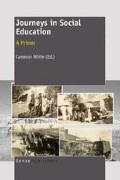Abstract
In many ways a discussion of a social education should actually be a cautionary tale. It can lead you in directions you never considered and cause you to ask questions that have no answer, only more questions about which you ponder. As with many things revolving around social education this for instance begins with a pairing of strange bedfellows. It is because of Michael Moore and the Baby Einstein video series that I find myself examining issues of democracy and what students are learning in today’s schools. That this unlikely duo could lead to the contemplation of such rich and deep topics begins to illustrate the power of social education.
Access this chapter
Tax calculation will be finalised at checkout
Purchases are for personal use only
Preview
Unable to display preview. Download preview PDF.
References
Aoki, T. (1990). Beyond the half-life of curriculum and pedagogy. One world. 27(2).
Bell, L. A., Washington, S., Weinstein, G., & Love, B. (1997). Knowing ourselves as instructors. In A. Darder, M. Baltodano, & R. D. Torres (Ed.), The critical pedagogy reader (pp. 464-478). New York: RoutledgeFlamer.
Dewey, J. (1916). Democracy and education. New York: The Free Press.
Freire, P. (1994). Pedagogy of the oppressed: 30th Anniversary edition. New York: Continuum.
Hirsch, E. D. (1998). Reality’s revenge: Research and ideology. Arts Education Policy Review. 99(4).
hooks, b. (1994). Teaching to transgress: Education as the practice of freedom. New York: Routledge.
http://www.infoplease.com/ipa/.html. Infoplease. © 2000-2006 Pearson Education, publishing as Info-please. 28 Sep. 2006 http://www.infoplease.com/ipa/A0781453.html
Kincheloe, J. (2001). Getting beyond the facts: Teaching social studies/social sciences in the twenty-first century. New York: Peter Lang.
McDonald, M. (2006). United States election project. Retrieved September 18, 2006, from George Mason University. Website: http://elections.gmu.edu/
Putnam, R. D. (2000). Bowling alone: The collapse and revival of American community. New York: Simon & Schuster Paperbacks.
Rochester, J. M. (2003). The training of idiots: Civics education in America’s schools. In J. Leming, L. Ellington, & K. Porter (Ed.), Where Did Social Studies Go Wrong? (pp. 6-39) Dayton: Thomas B. Fordham Foundation.
Zinn, H., & Macedo, D. (2005). Howard Zinn on democratic education. Boulder, CO: Paradigm Publishers.
Author information
Authors and Affiliations
Editor information
Editors and Affiliations
Rights and permissions
Copyright information
© 2011 Sense Publishers
About this chapter
Cite this chapter
Witschonke, C. (2011). Michael Moore, Baby Einstein, and Student Council Elections. In: White, C. (eds) Journeys in Social Education. SensePublishers. https://doi.org/10.1007/978-94-6091-358-7_14
Download citation
DOI: https://doi.org/10.1007/978-94-6091-358-7_14
Publisher Name: SensePublishers
Online ISBN: 978-94-6091-358-7
eBook Packages: Humanities, Social Sciences and LawEducation (R0)


